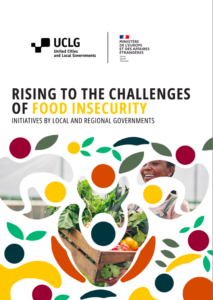 Food insecurity stands as a structural and systemic challenge exacerbated by growing inequalities. In the complex landscape of the 21st century, we confront global challenges such as inflation, conflicts, and the impacts of the climate crisis which directly affect food systems and, more importantly, the access of the most vulnerable to nourishment and agency over their diets. Accelerated climate change disrupts food production, while geopolitical conflicts and wars lead to surging food prices and alter food distribution chains.
Food insecurity stands as a structural and systemic challenge exacerbated by growing inequalities. In the complex landscape of the 21st century, we confront global challenges such as inflation, conflicts, and the impacts of the climate crisis which directly affect food systems and, more importantly, the access of the most vulnerable to nourishment and agency over their diets. Accelerated climate change disrupts food production, while geopolitical conflicts and wars lead to surging food prices and alter food distribution chains.
As we grapple with these multifaceted challenges, the urgency goes beyond immediate responses to emergency food insecurity. In this context how can we ensure access to sufficient, sustainable nutrition to all? What sustainable measures are implemented at the local level? What levers exist for local and regional governments to provide enduring answers, aligned with social, health, and environmental criteria?
This publication (available in English, Spanish and French) stands as a compendium of innovative ideas, best practices, and policy recommendations. It is more than a theoretical exploration; it is a tangible guide intended to assist local and regional governments in crafting effective policies to combat food insecurity. With the supportive backing of the French Ministry of Foreign Affairs and support from the World Sustainable Urban Food Center of Valencia (CEMAS), UCLG has commissioned a comprehensive study through the non-profit organization ‘Let’s Food’. This important study seeks to underscore the pivotal role of local and regional governments in combating food insecurity but also in ensuring universal access to nutrition and agency in food systems transformations.